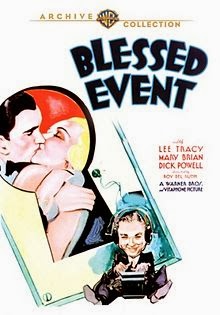I've seen a lot of unusual classic movies, but You Never Can Tell (1951) might be in a class all by itself when it comes to animal themed reincarnation private detective mystery comedies. Directed by film writer Lou Breslow, this offbeat picture stars Dick Powell as a murdered German Shepherd who comes back to earth as a human private detective in order to reveal the identity of his killer. If that sounds like a lot to process, there's also a reincarnated racehorse (Joyce Holden) along for the trip to serve as his assistant! Imagine Angel on My Shoulder (1946) mixed with The Shaggy Dog (1959) and Murder, My Sweet (1944) and you begin to get an idea of You Never Can Tell. As bizarre as that sounds, the whole thing comes together to create a delightful romp with some hilarious performances from Powell and Holden as the animals in human form. Those who enjoy oddball comedies will find plenty of laughs in this wacky gem, and it's definitely zany enough to hold the attention of younger viewers who are used to cartoon antics.
Powell plays private detective Rex Shepherd, who was previously known as King before his untimely demise thanks to a killer who slipped the dog a fatal dose of poison. King was murdered because he inherited the immense fortune of his misanthropic owner, and public opinion says his caretaker, the lovely young Ellen Hathaway (Peggy Dow), is the most likely culprit, since she inherited the money after King's death. Determined to expose the real murderer, King asks to return to Earth as a human being, where he presents himself to Ellen as a private eye who can clear her name and get justice for King. The racehorse Golden Harvest comes with him to be his sidekick, Goldie (Holden), but the two have a limited amount of time before they must either return to animal heaven or be stuck living out second lives as human beings.
There's not really much mystery about the killer's identity here, since King/Rex knows who poisoned him, but the noir angle lets Powell play the hard-boiled detective type again after his 1944 outing as Philip Marlowe in Murder, My Sweet and subsequent noir roles. Rex looks and talks like a detective but also enjoys snacking on dog food, chasing balls, and sitting on previously forbidden chairs. His biggest problem is convincing the cops that he's not insane, a criminal, or both, since he can't exactly explain his situation to them. Powell is having fun here, but Joyce Holden proves a scene-stealer as Goldie, and she gallops off with the picture at every opportunity. Her costume, complete with ponytail, straw hat, stirrups belt, and horseshoes under the soles of her pumps, is funny on its own, but Holden's performance goes all in on the Kentucky Thoroughbred persona. The regular human characters are pretty tame in comparison: Peggy Dow has ample charm and warmth as Ellen, but Charles Drake is a bit bland as dog trainer turned suitor Perry Collins. We don't see him for long, but it's also worth mentioning that King is played by animal star Flame the Wonder Dog, here nearing the end of his acting career after starring as Shep, Rusty, and Pal in a string of features and shorts.
 |
| Rex watches as Goldie surveys the latest racing news. |
The scenes on Earth feature constant gags and comic takes on the private detective plot, but the weirdest moments of You Never Can Tell take place in the afterlife, where King joins other dead animals to appear before their ruler/god, who is, of course, a lion. The cinematography for this segment makes the setting even stranger, and the scene goes on longer than you might want or expect, especially if you're showing this movie to kids who will immediately ask if animals have souls or go to heaven. The picture's commitment to this sequence is impressive, though, and it does show us why King wants to return to Earth and what he's giving up to do that. It also sets up the idea that other animals have become humans before (the movie even has an unwieldy portmanteau name for them - "humanimals"), so we aren't too surprised when Goldie identifies some of these animal people later in the picture.
If You Never Can Tell sounds like a treat, check out other animal themed comedies like Francis (1950), Rhubarb (1951), and The Incredible Mr. Limpet (1964). Lou Breslow was primarily a film writer; in addition to the story for You Never Can Tell, he also worked on A-Haunting We Will Go (1942), Murder, He Says (1945), and Bedtime for Bonzo (1951). Dick Powell rose to fame in musicals like 42nd Street (1933) and Gold Diggers of 1933 (1933), while Peggy Dow also appears in Harvey (1950) and Bright Victory (1951). Look for Joyce Holden in The Milkman (1950), Iron Man (1951), and Private Eyes (1953).



